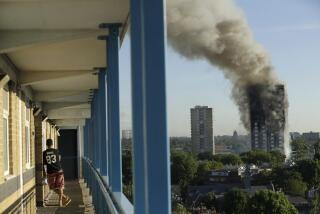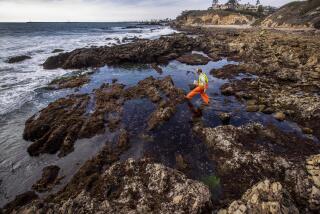Halliburton slams “erroneous” BP rig blast report
- Share via
London (Reuters) -- Halliburton Co, the oilfield services company that cemented the blown-out Gulf of Mexico well which caused the United States’ worst-ever oil spill, Sunday said a BP report into the disaster that laid the blame on the cement job offered a questionable account of events and “erroneous conclusions.”
Halliburton, based in Houston, Texas and Dubai, questioned tests BP said it conducted that showed Halliburton’s cement had failed, allowing channels to form, through which hydrocarbons could flow up the well and cause the explosion.
Thomas Roth, Halliburton’s vice president of cementing, told a panel of experts compiling a report on the causes of the disaster for the U.S. Department of the Interior that BP’s tests were “flawed,” and arrived at “erroneous conclusions.”
“Notwithstanding all the red flags, BP did not change its decision tree,” Roth told the hearing, which was broadcast live on the Internet on Sunday.
Halliburton also criticized BP for not seeking to take additional safety precautions when signs of potential problems with the well arose.
Roth blamed BP’s well design for the blast, criticizing the London-based oil giant’s failure to include additional barriers when it knew the well provided unusual challenges.
“The well design limited the ability to run a full cement bond log test,” he said.
Mark Bly, BP’s safety boss who was responsible for compiling the company’s own, 200-page internal investigation, was earlier quizzed by the panel.
BP’s investigation found well design played no part in the blast.
Najmedin Meshtaki, a professor at the Viterbi School of Engineering at the University of Southern California, criticized Bly for not considering management and governance structures which may have contributed to the rig blast.
But Bly said such issues were outside his remit in compiling the BP report.
Another committee member questioned why BP included the failure of the drilling rig’s fire and gas system to prevent hydrocarbon ignition as one of the eight main factors contributing to the blast, when Bly himself acknowledged the system was never designed to perform such a task.
More to Read
Sign up for Essential California
The most important California stories and recommendations in your inbox every morning.
You may occasionally receive promotional content from the Los Angeles Times.













